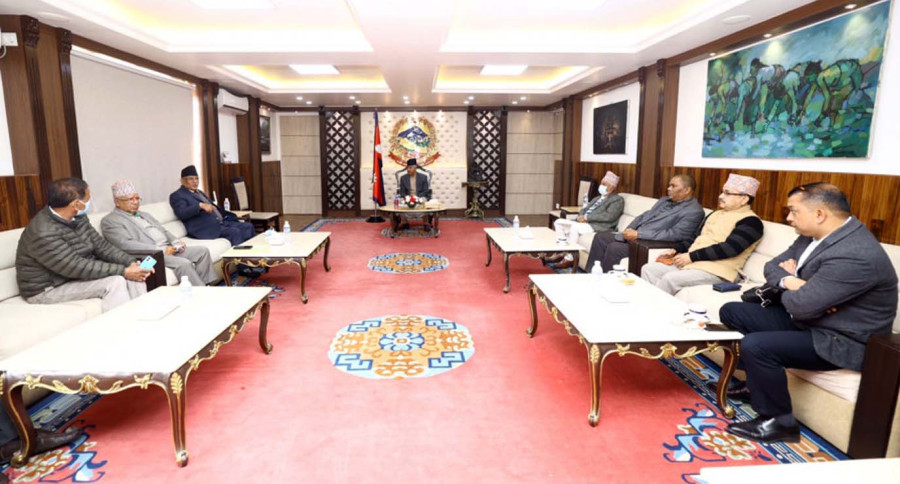Politics
Coalition crafts seat deal but Congress has a caveat
A meeting of the five-party coalition earlier on Thursday apportioned the 165 first-past-the-post House of Representatives seats based on a four-point criteria.
Purushottam Poudel & Nishan Khatiwada
After around two months of struggle, the seat-sharing talks of the ruling coalition for the November polls have finally reached a provisional conclusion.
The meeting of the five-party coalition on Thursday concluded a tentative seat-sharing arrangement for the 165 constituencies, says a leader privy to the developments.
The coalition had expedited negotiations after the Election Commission set October 9 as the deadline for the parties to nominate their candidates under the direct election system.
“Seat allotment is almost done. However, there could be no final agreement at Thursday’s meeting after the task force coordinator, Krishna Prasad Sitaula, came up with a new proposal that is more favourable to Congress, at the last minute,” a leader who participated in the meeting told the Post. “Coalition members could not agree to it.”
As per the provisional deal reached before Sitaula put forward the new proposal, the Nepali Congress had settled for 86 seats, the CPN (Maoist Centre) had agreed on 45, the CPN (Unified Socialist) 17, and the JSP had agreed on 15 seats. The Rastriya Janamorcha has been given two seats (see the seat breakdown in the table below).
A 11-member task force was formed on August 5 to recommend a seat-sharing formula following the ruling coalition's decision to go to the polls under an electoral alliance. However, the task force submitted the report to the top leaders on September 8 without concluding the process.
Meanwhile, the district presidents of the Nepali Congress from the Bagmati Province, in their meeting with Prime Minister and party leader Sher Bahadur Deuba on September 8, had demanded that the Congress be allocated both the provincial seats corresponding to the federal parliamentary constituencies denied to their party. There are two provincial assembly seats for every federal House of Representatives constituency.

The leaders of the ruling alliance attribute the delay in allocating the lower house first-past-the-post (FPTP) seats among coalition partners to the hassles of coordinating the task of seat-sharing for both the federal and provincial elections.
The task force on August 15 had devised four criteria for sharing seats.
The four criteria were FPTP seats won in the 2017 elections, proportional representation (PR) seats won in the 2017 elections, performance in last May’s local elections, and priority for top leaders of the parties. As the party leaders were unsure about the compromise their parties would have to make, the final seat-sharing agreement was delayed.
Similarly, the ruling coalition has also concluded a seat-sharing arrangement for provincial assemblies.
The ruling coalition had set two criteria for sharing the provincial assembly seats. As per the agreement between the parties on September 27, it was agreed that the party that won a particular constituency in 2017 would contest from the same constituency and the PR seats also would be shared on the same basis as the last elections.
Earlier, Congress had laid claim to at least 100 lower house FPTP seats. Other coalition partners had also claimed big bites of the pie—CPN (Maoist Center) had claimed 60 seats, Unified Socialist wanted 40 seats, Janata Samajbadi Party 32 seats, and Rastriya Janamorcha two seats.
The House of Representatives is 275-strong where 110 members are elected under the PR system and the remaining 165 members are elected under the FPTP system. Similarly, 550 members for the seven provincial assemblies will be elected—330 through the FPTP system and 220 through the PR system.




 14.12°C Kathmandu
14.12°C Kathmandu















